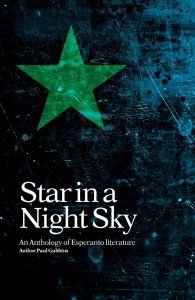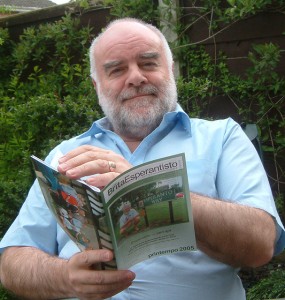Esperanto literature now in English! Posted by Chuck Smith on Jul 12, 2012 in Uncategorized
Today we have a special interview for you. This time, we have an interview by Tim Owen, the secretary of the Esperanto Association of Britain, with a member of the Akademio de Esperanto. Paul Gubbins is chief editor of the popular Esperanto magazine Monato and of the Esperanto Association of Britain’s twice-yearly magazine. He’s here to speak with Owen about a new project that differs from his usual fare, in that it’s actually written in English. Star in a Night Sky is an anthology of Esperanto literature, ranging from prize-winning poetry, plays, short stories and extracts from novels to a recipe and a scientific treatise.
Congratulations on your anthology Star in a Night Sky.
Thanks … but perhaps congratulations are a trifle premature. The book’s not out yet and no-one – apart from the publisher and me and now, presumably, the printer – has seen it. However, I know it’s on the way.
Well, I imagine congratulations will be in order. I get the impression you’re reasonably pleased with it.
At the risk of sounding arrogant, I have to say I am. Of course, pride goes before a fall, and it might be that when people actually see it they start to pick all sorts of holes in it. But I don’t think that will happen. Put it this way, if I wasn’t satisfied with it in its present form I wouldn’t put my name to it.
Can you give me a brief idea what the anthology’s about?
It’s an opportunity, for the very first time, to give the English-speaking world an overview of what makes this language of ours tick. And not just the language. More importantly the culture and the society it has built round it. So, yes, there’s a chapter on the language, its origins, its essential features, and then others on, if you like, the application of the language. How it’s created its own very specific Esperanto culture.
What do you mean … its own Esperanto culture?
The way we esperantists and our world are reflected in our writings. How we see ourselves. Much of English literature reflects English society, American literature American society, and so on. In the past Esperanto literature has been available to esperantists as a way of seeing ourselves but, because relatively little has been translated, no one else has had a look-in. In other words, the Esperanto world has remained a closed book to non-esperantists. While the translations in this anthology are but a drop in the ocean of Esperanto writing, spanning 125 years, they nevertheless provide a starting point for helping at least the English-speaking world gain an insight into this enduring, and endearing, phenomenon.
Isn’t that going to be a bit boring for non-esperantist readers? I mean – Esperanto navel-gazing?
No. I think not. As I said, this is a way of helping non-esperantists understand something of our world. Anyway, it’s not all navel-gazing, as you put it. Other chapters show Esperanto in its historical context, for instance as a victim of persecution under totalitarian regimes, while others have nothing to do with Esperanto at all – short stories, poems, for example, dealing with a range of subjects you might find in any national language. What I hope the anthology shows, of course, is not just the breadth of Esperanto writing but also its quality. Our three candidates for the Nobel Prize in Literature are all represented.
How does you see your book in comparison to the Concise Encyclopedia of the Original Literature of Esperanto by Geoffrey Sutton?
In many respects the two books are complementary, though their origins are entirely different and it’s chance … luck, if you like … that they represent two sides of one coin. Geoffrey’s encyclopedia is a work of serious scholarship, though eminently readable, aimed at people well-versed in Esperanto literature and with more than a passing interest in it. The anthology is designed for a general, non-specialist reader, with probably only the vaguest idea about Esperanto, but who would perhaps like to sample the language and its culture. For a non-esperantist, or someone learning the language, the anthology would be a far more sensible and more rewarding starting point than the encyclopedia. In studying mathematics you don’t start with quadratic equations but with simple arithmetic. The encyclopedia is something to move onto, later … though for many people, such as simpletons like me, simple arithmetic is more than enough.
It’s taken about two years to pull all this together. Did you encounter any problems on the way?
The usual. Promised translations not turning up, people failing to reply to emails. Having to remind translators, prod them. Though in one instance I received a translation almost by return. It was dreadful. I think the person concerned had run it through a translation package and then sent back the results. It took a lot a correcting and it would have been quicker for me to have done the thing myself. And, no, I’m not naming names. What I would say, though, is that the vast majority of translators did their work diligently and more than competently. They all deserve a huge pat on the back.
Do you feel there are any gaps, anything missing, in the anthology … where coverage could have been better?
With more time, more space, one could always broaden the scope, make improvements. I’m sorry there’s nothing from Latin America in the anthology but – and here I shall name names, or at any rate point a finger – people in South America to whom I wrote asking for permission to include something never replied. Likewise scientists. There’s only one piece on science … others whom I asked, again, never came back to me. So now I expect the critics will pounce on this lack and beat me round the head that Latin America and science are barely represented. Tough luck, critics, I’ve anticipated your comments.
Finally, do you think it’s going to sell?
I think so. I hope so. It certainly deserves to. The publisher tells me he has taken orders for 50 copies which, at this pre-publication stage, he assures me is encouraging. The University of Liverpool library is ordering a copy and I hope other universities will follow. I’m sure when the book appears, and people can see it, then other orders will follow.
I hope so, too. Thanks for your time in giving this interview.
Star in a Night Sky is released by Francis Boutle Publishers today, on July 12th, available for order for £17.99 with free postage within the UK. Paul Gubbins’s bilingual website features further interviews on the subjects of the book and Esperanto.

Build vocabulary, practice pronunciation, and more with Transparent Language Online. Available anytime, anywhere, on any device.
About the Author: Chuck Smith
I was born in the US, but Esperanto has led me all over the world. I started teaching myself Esperanto on a whim in 2001, not knowing how it would change my life. The timing couldn’t have been better; around that same time I discovered Wikipedia in it’s very early stages and launched the Esperanto version. When I decided to backpack through Europe, I found Esperanto speakers to host me. These connections led me to the Esperanto Youth Organization in Rotterdam, where I worked for a year, using Esperanto as my primary language. Though in recent years I’ve moved on to other endeavors like iOS development, I remain deeply engrained in the Esperanto community, and love keeping you informed of the latest news. The best thing that came from learning Esperanto has been the opportunity to connect with fellow speakers around the globe, so feel free to join in the conversation with a comment! I am now the founder and CTO of the social app Amikumu.






Comments:
LUIZ ALBERTO DE OLIVEIRA COELHO:
ho, kia bela surprizo. mi elkore gratulas por la iniciato. mi jam rapidas mendi mian ekzempleron!
Bill Walker:
Hi, Chuck.
Thanks for publishing the item – but the book price that you quote at the end seems to be incorrect.
The publisher’s website
http://www.francisboutle.co.uk/shopping_cart.php?&products_id=97
quotes a price of £19.99 with free P&P (i.e. NINEteen pounds 99, not seventeen pounds 99).
The book can also be bought from EAB’s bookshop
http://www.esperanto.org.uk/eab/bookcat.htm#stainanigsky
and we’re also charging £19.99 with free P&P